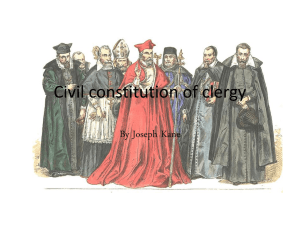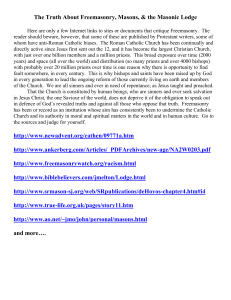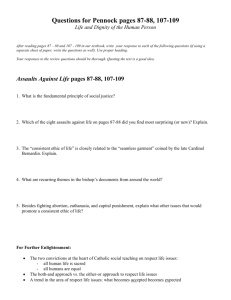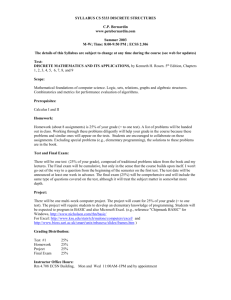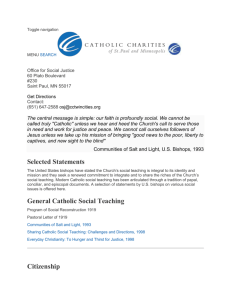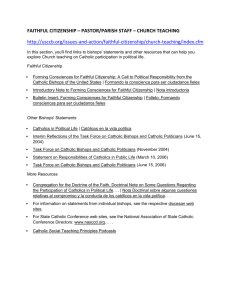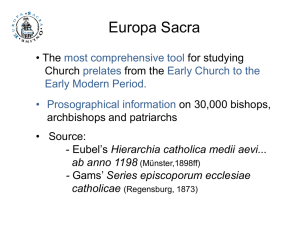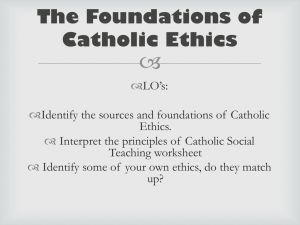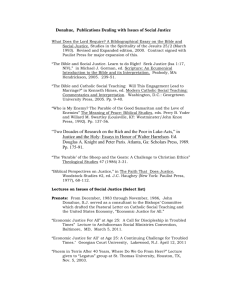An older generation of American Bishops played along with the
advertisement
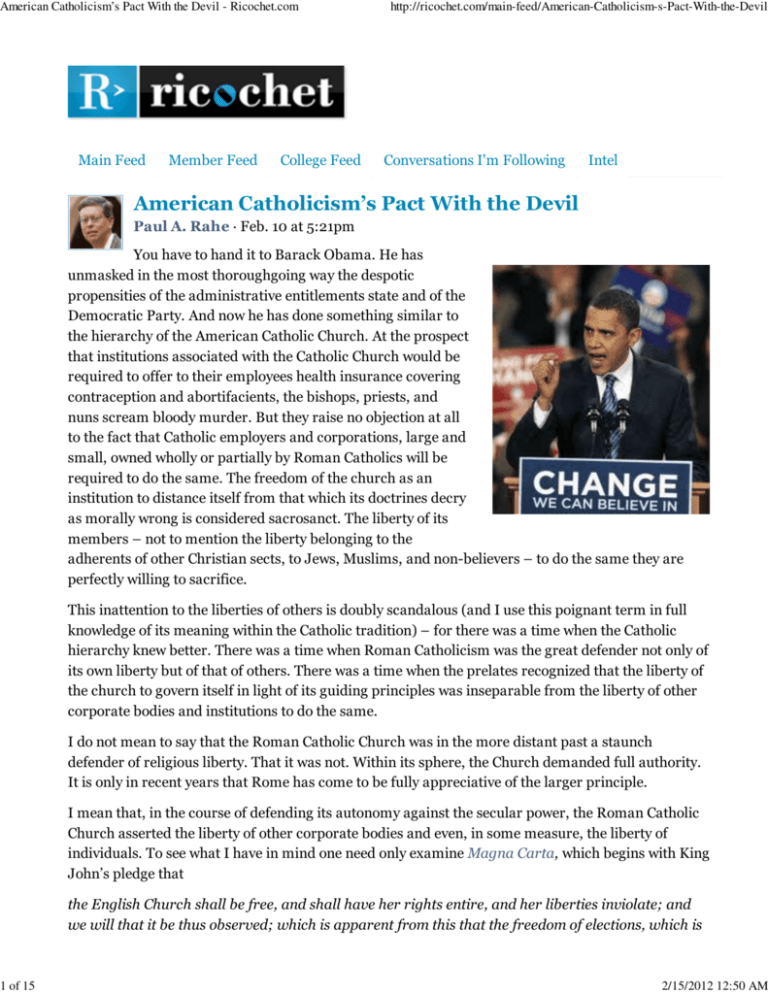
American Catholicism’s Pact With the Devil - Ricochet.com 1 of 15 Main Feed Member Feed College Feed http://ricochet.com/main-feed/American-Catholicism-s-Pact-With-the-Devil Conversations I'm Following Intel American Catholicism’s Pact With the Devil Paul A. Rahe · Feb. 10 at 5:21pm You have to hand it to Barack Obama. He has unmasked in the most thoroughgoing way the despotic propensities of the administrative entitlements state and of the Democratic Party. And now he has done something similar to the hierarchy of the American Catholic Church. At the prospect that institutions associated with the Catholic Church would be required to offer to their employees health insurance covering contraception and abortifacients, the bishops, priests, and nuns scream bloody murder. But they raise no objection at all to the fact that Catholic employers and corporations, large and small, owned wholly or partially by Roman Catholics will be required to do the same. The freedom of the church as an institution to distance itself from that which its doctrines decry as morally wrong is considered sacrosanct. The liberty of its members – not to mention the liberty belonging to the adherents of other Christian sects, to Jews, Muslims, and non-believers – to do the same they are perfectly willing to sacrifice. This inattention to the liberties of others is doubly scandalous (and I use this poignant term in full knowledge of its meaning within the Catholic tradition) – for there was a time when the Catholic hierarchy knew better. There was a time when Roman Catholicism was the great defender not only of its own liberty but of that of others. There was a time when the prelates recognized that the liberty of the church to govern itself in light of its guiding principles was inseparable from the liberty of other corporate bodies and institutions to do the same. I do not mean to say that the Roman Catholic Church was in the more distant past a staunch defender of religious liberty. That it was not. Within its sphere, the Church demanded full authority. It is only in recent years that Rome has come to be fully appreciative of the larger principle. I mean that, in the course of defending its autonomy against the secular power, the Roman Catholic Church asserted the liberty of other corporate bodies and even, in some measure, the liberty of individuals. To see what I have in mind one need only examine Magna Carta, which begins with King John’s pledge that the English Church shall be free, and shall have her rights entire, and her liberties inviolate; and we will that it be thus observed; which is apparent from this that the freedom of elections, which is 2/15/2012 12:50 AM American Catholicism’s Pact With the Devil - Ricochet.com 2 of 15 http://ricochet.com/main-feed/American-Catholicism-s-Pact-With-the-Devil reckoned most important and very essential to the English Church, we, of our pure and unconstrained will, did grant, and did by our charter confirm and did obtain the ratification of the same from our lord, Pope Innocent III, before the quarrel arose between us and our barons: and this we will observe, and our will is that it be observed in good faith by our heirs forever. Only after making this promise, does the King go on to say, “We have also granted to all freemen of our kingdom, for us and our heirs forever, all the underwritten liberties, to be had and held by them and their heirs, of us and our heirs forever.” It is in this context that he affirms that “no scutage nor aid shall be imposed on our kingdom, unless by common counsel of our kingdom, except for ransoming our person, for making our eldest son a knight, and for once marrying our eldest daughter; and for these there shall not be levied more than a reasonable aid.” It is in this context that he pledges that “the city of London shall have all it ancient liberties and free customs, as well by land as by water; furthermore, we decree and grant that all other cities, boroughs, towns, and ports shall have all their liberties and free customs.” It is in this document that he promises that “no freemen shall be taken or imprisoned or disseised or exiled or in any way destroyed, nor will we go upon him nor send upon him, except by the lawful judgment of his peers or by the law of the land” and that “to no one will we sell, to no one will we refuse or delay, right or justice.” One will not find such a document in eastern Christendom or in the sphere where Sunni Islam is prevalent. It is peculiar to Western Christendom – and it was made possible by the fact that, Christian West, church and state were not co-extensive and none of the various secular powers was able to exert its authority over the church. There was within each political community in the Christian West an imperium in imperio – a power independent of the state that had no desire to replace the state but was fiercely resistant to its own subordination and aware that it could not hope to retain its traditional liberties if it did not lend a hand in defending the traditional liberties of others. I am not arguing that the Church fostered limited government in the Middle Ages and in the early modern period. In principle, the government that it fostered was unlimited in its scope. I am arguing, however, that the Church worked assiduously to hem in the authority of the Christian kings and that its success in this endeavor provided the foundation for the emergence of a parliamentary order. Indeed, I would go further. It was the Church that promoted the principles underpinning the emergence of parliaments. It did so by fostering the species of government that had emerged within the church itself. Given that the Church in the West made clerical celibacy one of its principal practices (whether it was honored in the breach or not), the hereditary principle could play no role in its governance. Inevitably, it resorted to elections. Monks elected abbots, the canons of cathedrals elected bishops, the college of cardinals elected the Pope. The principle articulated in canon law — the only law common to all of Western Europe — to explain why these practices were proper was lifted from the Roman law dealing with the governance of waterways: “Quod omnes tangit,” it read, “ab omnibus tractari debeat: That which touches all should be dealt with by all.” In pagan antiquity, this meant that those upstream could not take all of 2/15/2012 12:50 AM American Catholicism’s Pact With the Devil - Ricochet.com 3 of 15 http://ricochet.com/main-feed/American-Catholicism-s-Pact-With-the-Devil the water and that those downstream had a say in its allocation. It was this principle that the clergymen who served as royal administrators insinuated into the laws of the kingdoms and petty republics of Europe. It was used to justify communal self-government. It was used to justify the calling of parliaments. And it was used to justify the provisions for self-governance contained within the corporate charters issued to cities, boroughs, and, in time, colonies. On the eve of the American Revolution, you will find it cited by John Dickinson in The Letters of a Pennsylvania Farmer. The quod omnes tangit principle was not the foundation of modern liberty, but it was its antecedent. And had there been no such antecedent, had kings not been hemmed in by the Church and its allies in this fashion, I very much doubt that there ever would have been a regime of limited government. In fact, had there not been a distinction both in theory and in fact between the secular and the spiritual authority, limited government would have been inconceivable. The Reformation weakened the Church. In Protestant lands, it tended to strengthen the secular power and to promote a monarchical absolutism unknown to the Middle Ages. Lutheranism and Anglicanism were, in effect, Caesaro-Papist. In Catholic lands, it caused the spiritual power to shelter itself behind the secular power and become, in many cases, an appendage of that power. But the Reformation and the religious strife to which it gave rise also posed to the secular power an almost insuperable problem – how to secure peace and domestic tranquility in a world marked by sectarian competition. Limited government – i. e., a government limited in its scope – was the solution ultimately found, and John Locke was its proponent. In the nascent American republic, this principle was codified in its purest form in the First Amendment to the Constitution. But it had additional ramifications as well – for the government’s scope was limited also in other ways. There were other amendments that made up what we now call the Bill of Rights, and many of the states prefaced their constitutions with bills of rights or added them as appendices. These were all intended to limit the scope of the government. They were all designed to protect the right of individuals to life, liberty, the acquisition and possession of property, and the pursuit of happiness as these individuals understood happiness. Put simply, liberty of conscience was part of a larger package. This is what the hierarchy of the Roman Catholic Church forgot. In the 1930s, the majority of the bishops, priests, and nuns sold their souls to the devil, and they did so with the best of intentions. In their concern for the suffering of those out of work and destitute, they wholeheartedly embraced the New Deal. They gloried in the fact that Franklin Delano Roosevelt made Frances Perkins – a devout Anglo-Catholic laywoman who belonged to the Episcopalian Church but retreated on occasion to a Catholic convent – Secretary of Labor and the first member of her sex to be awarded a cabinet post. And they welcomed Social Security – which was her handiwork. They did not stop to ponder whether public provision in this regard would subvert the moral principle that children are responsible for the well-being of their parents. They did not stop to consider whether this measure would reduce the incentives for procreation and nourish the temptation to think of sexual intercourse as an indoor 2/15/2012 12:50 AM American Catholicism’s Pact With the Devil - Ricochet.com 4 of 15 http://ricochet.com/main-feed/American-Catholicism-s-Pact-With-the-Devil sport. They did not stop to think. In the process, the leaders of the American Catholic Church fell prey to a conceit that had long before ensnared a great many mainstream Protestants in the United States – the notion that public provision is somehow akin to charity – and so they fostered state paternalism and undermined what they professed to teach: that charity is an individual responsibility and that it is appropriate that the laity join together under the leadership of the Church to alleviate the suffering of the poor. In its place, they helped establish the Machiavellian principle that underpins modern liberalism – the notion that it is our Christian duty to confiscate other people’s money and redistribute it. At every turn in American politics since that time, you will find the hierarchy assisting the Democratic Party and promoting the growth of the administrative entitlements state. At no point have its members evidenced any concern for sustaining limited government and protecting the rights of individuals. It did not cross the minds of these prelates that the liberty of conscience which they had grown to cherish is part of a larger package – that the paternalistic state, which recognizes no legitimate limits on its power and scope, that they had embraced would someday turn on the Church and seek to dictate whom it chose to teach its doctrines and how, more generally, it would conduct its affairs. I would submit that the bishops, nuns, and priests now screaming bloody murder have gotten what they asked for. The weapon that Barack Obama has directed at the Church was fashioned to a considerable degree by Catholic churchmen. They welcomed Obamacare. They encouraged Senators and Congressmen who professed to be Catholics to vote for it. I do not mean to say that I would prefer that the bishops, nuns, and priests sit down and shut up. Barack Obama has once again done the friends of liberty a favor by forcing the friends of the administrative entitlements state to contemplate what they have wrought. Whether those brought up on the heresy that public provision is akin to charity will prove capable of thinking through what they have done remains unclear. But there is now a chance that this will take place, and there was a time – long ago, to be sure, but for an institution with the longevity possessed by the Catholic Church long ago was just yesterday – when the Church played an honorable role in hemming in the authority of magistrates and in promoting not only its own liberty as an institution but that of others similarly intent on managing their own affairs as individuals and as members of subpolitical communities. In my lifetime, to my increasing regret, the Roman Catholic Church in the United States has lost much of its moral authority. It has done so largely because it has subordinated its teaching of Catholic moral doctrine to its ambitions regarding an expansion of the administrative entitlements state. In 1973, when the Supreme Court made its decision in Roe v. Wade, had the bishops, priests, and nuns screamed bloody murder and declared war, as they have recently done, the decision would have been reversed. Instead, under the leadership of Joseph Bernardin, the Cardinal-Archbishop of Chicago, they asserted that the social teaching of the Church was a “seamless garment,” and they treated abortion as one concern among many. Here is what Cardinal Bernardin said in the Gannon Lecture at Fordham University that he delivered in 1983: 2/15/2012 12:50 AM American Catholicism’s Pact With the Devil - Ricochet.com 5 of 15 http://ricochet.com/main-feed/American-Catholicism-s-Pact-With-the-Devil Those who defend the right to life of the weakest among us must be equally visible in support of the quality of life of the powerless among us: the old and the young, the hungry and the homeless, the undocumented immigrant and the unemployed worker. Consistency means that we cannot have it both ways. We cannot urge a compassionate society and vigorous public policy to protect the rights of the unborn and then argue that compassion and significant public programs on behalf of the needy undermine the moral fiber of the society or are beyond the proper scope of governmental responsibility. This statement, which came to be taken as authoritative throughout the American Church, proved, as Joseph Sobran observed seven years ago, “to be nothing but a loophole for hypocritical Catholic politicians. If anything,” he added, "it has actually made it easier for them than for non-Catholics to give their effective support to legalized abortion – that is, it has allowed them to be inconsistent and unprincipled about the very issues that Cardinal Bernardin said demand consistency and principle.” In practice, this meant that, insofar as anyone pressed the case against Roe v. Wade, it was the laity. I was reared a Catholic, wandered out of the Church, and stumbled back in more than thirteen years ago. I have been a regular attendee at mass since that time. I travel a great deal and frequently find myself in a diocese not my own. In these years, I have heard sermons articulating the case against abortion thrice – once in Louisiana at a mass said by the retired Archbishop there; once at the cathedral in Tulsa, Oklahoma; and two weeks ago in our parish in Hillsdale, Michigan. The truth is that the priests in the United States are far more likely to push the “social justice” agenda of the Church from the pulpit than to instruct the faithful in the evils of abortion. And there is more. I have not once in those years heard the argument against contraception articulated from the pulpit, and I have not once heard the argument for chastity articulated. In the face of the sexual revolution, the bishops priests, and nuns of the American Church have by and large fallen silent. In effect, they have abandoned the moral teaching of the Roman Catholic Church in order to articulate a defense of the administrative entitlements state and its progressive expansion. There is another dimension to the failure of the American Church in the face of the sexual revolution. As, by now, everyone knows, in the 1980s, when Cardinal Bernardin was the chief leader of the American Church and the man most closely consulted when the Vatican selected its bishops, it became evident to the American prelates that they had a problem – that, in many a diocese, there were priests of a homoerotic orientation who were sexual predators – pederasts inclined to take advantage of young boys. They could have faced up to the problem at that time; they could have turned in the malefactors to the secular authorities; they could have prevented their further contact with the young. Instead, almost certainly at the instigation of Cardinal Bernardin, they opted for another policy. They hushed everything up, sent the priests off for psychological counseling, and reassigned them to other parishes or even dioceses – where they continued to prey on young boys. In the same period, a number of the seminaries in which young men were trained for the priesthood 2/15/2012 12:50 AM American Catholicism’s Pact With the Devil - Ricochet.com 6 of 15 http://ricochet.com/main-feed/American-Catholicism-s-Pact-With-the-Devil became, in effect, brothels – and nothing was done about any of this until the newspapers broke the story and the lawsuits began. There is, I would suggest, a connection between the heretical doctrine propagated by Cardinal Bernardin in the Gannon Lecture and the difficulties that the American Church now faces. Those who seek to create heaven on earth and who, to this end, subvert the liberty of others and embrace the administrative entitlements state will sooner or later become its victims. Earlier today, Barack Obama offered the hierarchy “a compromise.” Under its terms, insurance companies offering healthcare coverage will be required to provide contraception and abortifacients, but this will not be mentioned in the contracts signed by those who run Catholic institutions. This “compromise” is, of course, a farce. It embodies a distinction where there is, in fact, no difference. It is a snare and a delusion, and I am confident that the Catholic Left, which is still dominant within the Church, will embrace it – for it would allow the bishops, priests, and nuns to save face while, in fact, paying for the contraception and abortifacients that the insurance companies will be required to provide. As if on cue, Sister Carol Keehan, a prominent Obamacare supporter who heads the Catholic Health Association, immediately issued a statement in which she announced that she is “pleased and grateful that the religious liberty and conscience protection needs of so many ministries that serve our country were appreciated enough that an early resolution of this issue was accomplished.” Perhaps, however, Barack Obama has shaken some members of the hierarchy from their dogmatic slumber. Perhaps, a few of them – or among younger priests some of their likely successors – have begun to recognize the logic inherent in the development of the administrative entitlements state. The proponents of Obamacare, with some consistency, pointed to Canada and to France as models. As anyone who has attended mass in Montreal or Paris can testify, the Church in both of these places is filled with empty pews. There is, in fact, not a single country in the social democratic sphere where either the Catholic Church or a Protestant Church is anything but moribund. This is by no means fortuitous. When entitlements stand in for charity and the Social Gospel is preached in place of the Word of God, heaven on earth becomes the end, and Christianity goes by the boards. It took a terrible scandal and a host of lawsuits to get the American Church to rid itself of the pederast priests and clean up its seminaries. Perhaps the tyrannical ambitions of Barack Obama will occasion a rethinking of the social-justice agenda. The ball is now in the court of Archbishop Timothy Dolan of New York, who has welcomed the President's gesture without indicating whether it is adequate. Upon reflection, he can accept the fig leaf that President Obama has offered him. Or he can put Sister Keehan and her supporters in their place and fight. If he wants to regain an iota of the moral authority that the Church possessed before 1973, he will do the latter. The hour is late. Next time, the masters of the administrative entitlements state won’t even bother to offer the hierarchy a fig leaf. They know servility when they see it. UPDATE: Friday night, shortly after I posted this piece, as Anne Coletta pointed out in Comment 5 2/15/2012 12:50 AM American Catholicism’s Pact With the Devil - Ricochet.com 7 of 15 http://ricochet.com/main-feed/American-Catholicism-s-Pact-With-the-Devil below, the United States Conference of Catholic Bishops issued a carefully worded statement critical of the fig leaf President Obama offered them. In the meantime, the Rev. John Jenkins, President of the University of Notre Dame, applauded "the willingness of the administration to work with religious organizations to find a solution acceptable to all parties." Comment (135) · Follow (26) Email Page: 1 2 3 Comments (displaying 135 of 135): I have no joy in this. Millions of believing Catholics will suffer humiliation, and I am an Evangelical Pentecostal Christian, who finds no joy in what the European minded Catholic hierarchy have done to themselves and their faithful. This is a genuinely tragic event for all of Christendom. #1 · Feb. 10 at 5:36pm · Like (12) · Share · Direct link 5 6 7 Comment Filters Contributor Comments raycon Haven't read the whole article yet... I will though. You are saying what I have only said to my family and friends on this issue. The Catholic ox is finally being gored. Six decades of kissing the socialist ring is finally, to use a phrase, coming home to roost. 4 Joined Oct '10 show: all / none Bill Walsh (1) Paul A. Rahe (22) Bill McGurn (2) Member Comments show: all / none raycon (2) flownover (3) Anne Coletta (1) twvolck (1) Alcina (1) Fricosis Guy (3) Jason Hall (7) Grendel (4) Pseudodionysius (7) Noesis Noeseos (3) ...plus 34 others Comment Popularity 10+ Likes (8) 5-10 Likes (8) 2/15/2012 12:50 AM American Catholicism: A Call to Arms - Ricochet.com 1 of 16 Main Feed Member Feed http://ricochet.com/main-feed/American-Catholicism-A-Call-to-Arms College Feed Conversations I'm Following Intel American Catholicism: A Call to Arms Paul A. Rahe · 22 hours ago Last Friday, I posted on Ricochet a piece entitled American Catholicism’s Pact With the Devil. In it, among other things, I traced the crisis now faced by American Catholicism to the reign within the American Church of Joseph Bernardin, CardinalArchbishop of Chicago. In my haste, I got a detail or two wrong, and I was challenged not only with regard to the Cardinal’s cursus honorum but also with regard to the role he played in the scandal concerning the sexual abuse of children by Roman Catholic clergy. This post is meant to correct the record with regard to minor details, to flesh it out with regard to the profound damage done the American Church by Cardinal Bernardin, and to suggest that we might be witnessing a turning of the tide. In doing so, I will draw on various sources. But let me say at the outset that the most important of these is the article The End of the Bernardin Era: The Rise, Dominance, and Decline of a Culturally Accommodating Catholicism published by George Weigel in February, 2011 in First Things. Here, in Weigel’s words, is the pre-eminent fact: In his prime, Joseph Bernardin was arguably the most powerful Catholic prelate in American history; he was certainly the most consequential since the heyday of James Cardinal Gibbons of Baltimore in the late nineteenth and early twentieth centuries. When he was in his early forties, Bernardin was the central figure in defining the culture and modus operandi of the U.S. bishops’ conference. Later, when he became archbishop of Cincinnati and cardinal archbishop of Chicago, Bernardin’s concept and style of episcopal ministry set the pattern for hundreds of U.S. bishops. Bernardin was also the undisputed leader of a potent network of prelates that dominated the affairs of the American hierarchy for more than two decades; observers at the time dubbed it the “Bernardin Machine.” Here are some of the details. Bernardin was born in 1928 in Columbia, South Carolina. He was ordained a priest for the Charleston diocese in 1952. His talents were recognized immediately, and he rocketed up the clerical ladder. He was a monsignor within seven years. By 1966, he was an auxiliary bishop in Atlanta. Two years later, he was named the general secretary of the National Conference of Catholic Bishops (NCCB), the forerunner of today’s United States Conference of Catholic Bishops (USCCB). The NCCB was at that time new; Bernardin was the very first to serve as its general secretary; and he was one of the two men who shaped the institution – which to this day 2/15/2012 7:46 AM American Catholicism: A Call to Arms - Ricochet.com 2 of 16 http://ricochet.com/main-feed/American-Catholicism-A-Call-to-Arms formulates policy for the American bishops. In 1972, Joseph Bernardin became Archbishop of Cincinnati, and two years later he was named – at the ripe old age of forty-six – the presiding officer of the NCCB. In his years as an official of that body, he hired its staff, and he put his stamp on the organization. Moreover, for decades, the principal posts in the NCCB would be in the hands of Bernardin himself or of one of “Bernardin’s boys,” as they were called. His first five successors as presiding officer of the NCCB -- John Quinn, John Roach, James Malone, John May, and Daniel Pilarczyk – were his nominees. Moreover, as George Weigel makes clear, the Bernardin era did not end when the Cardinal died of pancreatic cancer in 1996. In fact, it was not fully over until November 2010, when Archbishop Timothy Dolan of the city of New York was elected the presiding officer of the UCCB in preference to Bishop Gerald Kicanas of Tucson, who had started his episcopal career as one of Bernardin’s auxiliaries. As Diogenes at CatholicCulture.Org put it some years ago, “It is almost impossible to over-estimate the importance of Cardinal Bernardin to the U.S. Catholic Church; on that point his critics and admirers are unanimous. Like Bismarck or Stalin or Richard Daley, he created and presided over a bureaucracy whose impersonality became his personal tool, and the way the USCCB does business bears his stamp to this day.” The church that dissolved in scandal in 2002 – when The Boston Globe began reporting on the sexual abuse of minors by Catholic priests and the protection provided the malefactors by Bernard Francis Cardinal Law of the Boston Archdiocese and his episcopal predecessors – was Bernardin’s church. As a member of the Congregation of Bishops in Rome, he played a decisive role in picking the American bishops and in determining their assignments. Moreover, his influence was dispositive for a long time in determining who would head the bishop’s conference, and it was under the Bernardin machine that the American church decided how it would handle the grave sexual abuse scandal that erupted in the diocese of Lafayette, Louisiana in the mid-1980s. In the wake of that event, three individuals joined together – with encouragement from the Papal Nuncio and a number of bishops – to consider the problem of the sexual abuse of minors by clergymen as it applied to the American Church as a whole. The three were Father Michael Peterson, M. D, a psychiatrist who specialized in the treatment of wayward priests.; F. Ray Mouton, J.D., the defense attorney hired by the Lafayette, Louisiana diocese to defend a priest who had sexually abused eleven different boys; and Father Thomas P. Doyle, O.P. J.C.D., a canon lawyer attached to the office of the Papal Nuncio in Washington, D. C. The confidential report produced by this committee was a bombshell. It suggested that sexual abuse was quite common. It warned about the prospect of lawsuits and predicted that the American Church would eventually have to pay out more than a billion dollars; it firmly and fiercely denied that there was any possibility of curing those who sexually abused minors; it spoke movingly about the long-term damage done those who were sexually abused as children; it argued for an immediate suspension of clergymen who were accused; and it urged the bishops to weed out from the seminaries those likely to engage in such misconduct. Peterson, Mouton, and Doyle hoped to have their report discussed in detail by the bishops at their annual conference, but Bernardin’s boys at the NCCB saw to it that the report was tabled. Some 2/15/2012 7:46 AM American Catholicism: A Call to Arms - Ricochet.com 3 of 16 http://ricochet.com/main-feed/American-Catholicism-A-Call-to-Arms months later, Father Peterson, who would die of AIDS in 1987, sent a copy to every bishop in the United States. He received no response. When Father Doyle insisted on pressing the issue, he was dropped by the Papal Nuncio and treated as persona non grata by the American bishops. He ended up in exile as a chaplain on a military base in Greenland, and the problem was hushed up. It was thanks to the Bernardin machine that the bishops continued sending the perpetrators to psychological counseling and then dispatching them to new parishes or to other dioceses where there was no one who knew about their past. Bernardin and his boys did not invent the culture of clerical corruption. In full knowledge of what was going on nationwide, however, they perpetuated it. In Chicago – where Bernardin became Archbishop in 1982 and Cardinal a year later – things came to a head a full decade before they did in Boston, and, in the face of the scandal, Bernardin was, as always, nimble and effective. When the lawsuits began, and the Cook County State’s Attorney Jack O`Malley turned a baleful eye on the Archdiocese, The Chicago Tribune reported that Cardinal Bernardin “defused a conflict” with the prosecutor by issuing a “20-page guideline” for the Archdiocese, which replaced “a priest-managed investigations system with a non-clergy ‘fitness review administrator,’” tasked with reporting priestly misconduct to the Illinois Department of Children and Family Services, and “a nine-member board . . . consisting of a nun, five laypeople and three parish pastors.” To this day, Bernardin’s admirers cite this as a sign of his integrity and courage and of his eagerness to confront the culture of corruption. In fact, it was a species of “damage control,” and it constituted a confession that, ten years after Bernardin, a vigorous and effective administrator, had taken over the Chicago Archdiocese, its priests and their archbishop could not be trusted to deal with the sexual abuse of minors by the archdiocesan clergy. In this, as in other matters, Bernardin was the model for the other bishops. It was not until O’Malley began his investigation of the Archdiocese that Bernardin made these changes. He did not introduce them voluntarily. He did so under pressure. Had The Chicago Tribune and the other newspapers in Chicago been as diligent in digging up dirt as The Boston Globe would be a decade later, the scandal that ripped through the church in 2002 might well have begun in Chicago in 1992. In 1993, Bernardin was himself accused of sexual abuse by a former seminarian named Stephen Cook, who was dying of AIDS. Bernardin fiercely denied the charge; the Vatican and many of the American bishops rallied in his defense; and the seminarian later dropped the suit. The public story at the time was that Cook then apologized to the Cardinal. But, in the keynote address that he delivered to the LINKUP National Conference held by the survivors of clerical abuse in 2003, A. W. Richard Sipe told a different story: A sad, and as yet unsolved, chapter of the sexual abuse saga in the United States is the story of Cardinal Joseph Bernardin. This man probably did die a saint, as his close friends attest. Without doubt, he did many wonderful things for the Church in America. In the media flurry that surrounded the allegation of sexual abuse, an impertinent reporter asked the Cardinal, "Are you living a sexually active life?" A simple "no" would have been sufficient. But the Cardinal said, "I am sixty-five years old, and I have always lived a chaste and celibate life." However defensible in the arena of public assault, I knew that the statement was not unassailably true. Years before, several priests who were associates of Bernardin prior to his move to Chicago 2/15/2012 7:46 AM American Catholicism: A Call to Arms - Ricochet.com 4 of 16 http://ricochet.com/main-feed/American-Catholicism-A-Call-to-Arms revealed that they had "partied" together; they talked about their visits to the Josephinum to socialize with seminarians. It is a fact that Bernardin's accuser did not ever retract his allegations of abuse by anyone's account other than Bernardin's. If, as reported, three million dollars were paid in handling the scandal, certainly there are still informed people in Chicago who know at least part of the story. And the story is complex. It holds repercussions far beyond Chicago and one allegation. There are three reasons why we should not dismiss out of hand as malicious gossip Sipe’s euphemistically-phrased claims. The first is that what he reports with regard to the hush money purportedly paid the seminarian conforms to what was standard operating procedure in American dioceses at the time. The Boston Globe reports that, between 1992 and 2002, the Archdiocese of Boston secretly settled more than seventy cases of child abuse in this fashion. It would not be odd if this were done in Chicago as well. In fact, it is precisely what one would expect. The second reason for taking Sipe’s claims seriously is the fact that what we know about the clerical sexual abuse of minors is entirely a consequence of the lawsuits brought against the church and the investigations undertaken by the secular authorities. Had it not been for these, the great game of shuttling the predators around would still be going on. There is no reason at all to accord the benefit of the doubt to the bishops. In and soon after 2002 we learned what accomplished liars they had been. The third reason for suspecting that what Sipe reports might be right is that he is as well-informed an observer as we have. Richard Sipe is a former priest. He was a Benedictine monk for eighteen years, was laicized by the Vatican in 1970, and married. For a long period prior to his departure from the priesthood, he was involved as a psychologist in counseling priests who were having trouble leading celibate lives. He continued doing so after leaving the priesthood, and at various times both before and after he taught in Catholic seminaries. He has testified in case after case involving the sexual abuse of minors by clergymen. He has written a number of books on the subject, and he is a Catholic liberal sympathetic to the political stance of Cardinal Bernardin. I cannot prove that he is telling the truth, but there is no reason to think him a fabricator of lies. When he estimates that about 6% of the priests in the United States in the 1980s were guilty of the sexual abuse of minors and that two-thirds of the bishops had experience in shuttling these men around, his assertions are entirely plausible. The John Jay Report produced in 2004 for the Catholic bishops by the John Jay College of Criminal Justice of the City of New York indicates that, between 1950 and 2002, 4% of the priests in the United States were accused at one time or another of child abuse, and we can be confident that there were perpetrators who were never accused. Two-thirds of these allegations were lodged 2/15/2012 7:46 AM American Catholicism: A Call to Arms - Ricochet.com 5 of 16 http://ricochet.com/main-feed/American-Catholicism-A-Call-to-Arms between 1993 and 2003. Prior to that time, shame on the part of the victims, fear of the fury that they would incur if they went public, and an ill-deserved respect for the hierarchy of the Church generally dictated silence. As Diogenes observes, one of the major themes of Sipe’s ruminations is that we will never fully understand what happened if we do not attend to “the connection between the sexual misdeeds of churchmen in powerful positions and the cover-ups -- personal and institutional -- perpetrated by men they recruited, groomed, and promoted.” Here is the way that Sipe put it in his keynote address: Why is the fight so furious? Why is the struggle to keep FACTS buried so vigorous? Important clues exist in the genealogy of abuse. I have been able to trace victims of clergy and bishop abuse to the third generation. Often, the history of clergy abusers reveals that the priest himself was abused – sometimes by a priest. The abuse may have occurred when the priest was a child, but not necessarily. Sexual activity between an older priest and an adult seminarian or young priest sets up a pattern of institutional secrecy. When one of the parties rises to a position of power, his friends are in line also for recommendations and advancement. The dynamic is not limited to homosexual liaisons. Priests and bishops who know about each other's sexual affairs with women, too, are bound together by draconian links of sacred silence. A system of blackmail reaches into the highest corridors of the American hierarchy and the Vatican and thrives because of this network of sexual knowledge and relationships. Secrecy flourishes, like mushrooms on a dank dung pile, even among good men in possession of the facts of the dynamic, but who cannot speak lest they violate the Scarlet Bond. I have interviewed at length a man who was a sexual partner of Bishop James Rausch. This was particularly painful for me since Rausch and I were young priests together in Minnesota in the early 60s. He went on to get his social work degree and succeeded Bernardin as Secretary of the Bishops' National Conference in DC. He became Bishop of Phoenix. It is patently clear that he had an active sexual life. It did involve at least one minor. He was well acquainted with priests who were sexually active with minors (priests who had at least 30 minor victims each). He referred at least one of his own victims to these priests. What was his sexual genealogy? What are the facts of his celibate/sexual development and practice? Did those who knew him know nothing of his life? Perhaps so! But he was in a spectacular power grid of bright men. He was Bernardin's successor at the US Conference. Bishop Thomas Kelly at Louisville was his successor. Msgr. Daniel Hoye and Bishop Robert Lynch, among others, took over his job. Let me be perfectly clear. I am not saying or implying in any way that these men were partners in "crime" with Jim Rausch. But I am saying that anyone who sets out to solve a mystery has to ask people who knew the principal, "What, if anything, did you know or observe about the alleged perpetrator?" After all, the Church's hardened resistance to dealing honestly with the problem of sexual abuse on 2/15/2012 7:46 AM American Catholicism: A Call to Arms - Ricochet.com 6 of 16 http://ricochet.com/main-feed/American-Catholicism-A-Call-to-Arms their own has compelled the civil authorities to move in, ask the questions, investigate allegations. The Church in America has been its own worst enemy – creating mysteries and doubts, rather than clear answers that inspire confidence. Even bishops innocent of sexual violations themselves, by their silence, concealment of facts and resistance to effective solutions, choose to be part of a genealogy of abuse and reinforce a culture of deceit. In this speech, Sipe does not use the phrase “lavender mafia,” but his focus is the network of powerful clergymen who protected the malefactors and allowed the seminaries to become brothels. As Diogenes puts it, We don't need to jump to a Grand Unified Theory of conspiracy in order to recognize corruption; ordinary self-interest can account for particular incidents of ad hoc collusion by which gay bishops who are sexually compromised take care of their own. By the same token, it is absurd to pretend that politically astute gay bishops in key positions of influence could have been unaware of the liabilities of the men they advanced, defended, and perjured themselves for. To anyone who has paid attention to the major players in the Crisis, Sipe's roster of Bernardin cronies is striking. For a glimpse of the Southwest Triangle (Rausch, O'Brien, Moreno) go here, here, here, here, and here. For Robert Lynch's connections, go here and here. Thomas Kelly, whose archdiocese now has problems of its own, winked through Rudy Kos's annulment (in spite of his wife's insistence he was a pedophile), clearing his way into the Dallas seminary headed by Michael Sheehan, who later became Archbishop of Santa Fe. A power grid indeed! If you follow the links – most of which are still active – you will get the picture, which is in no way pretty. Too many of those who found their way into positions of influence and power thanks to the patronage of Cardinal Bernardin not only failed to honor the vow of celibacy they had themselves taken but were criminally lax in its enforcement. The effect was to foster a culture of corruption throughout the American Church and to dishearten those – whether homoerotically or heterosexually inclined – who were fiercely intent on honoring their own vows. It was in this context that the small minority who preyed on children were protected from the legal consequences of their crimes and allowed to continue. Bernardin and his proteges regarded the sexual abuse of children as a moral lapse comparable to clerical drunkenness. It is, as I argued in American Catholicism’s Pact With the Devil, no accident that the prelates most responsible for the perpetuation of this vile modus operandi were also inclined to downplay the significance of Roe v. Wade, to divert the energy of the institutional Church into a struggle on behalf of the administrative entitlements state, and to discourage the clergy from addressing the challenge posed to Christian morality by the sexual revolution. Joseph Bernardin became the presiding officer of the NCCB shortly after the Supreme Court handed down its opinion in Roe v. Wade, and it fell to him to articulate the strategy that the Church with regard to that decision has followed ever since. As George Weigel intimates, it is a good thing that the Bernardin era has come to an end. One can only hope that Archbishop Dolan is up to the task of cleaning the Augean Stables built by Joseph Cardinal Bernardin. So far, he and his colleagues have done a better job than I realized when I posted American Catholicism’s Pact With the Devil. When I wrote that piece, I relied on the reports 2/15/2012 7:46 AM American Catholicism: A Call to Arms - Ricochet.com 7 of 16 http://ricochet.com/main-feed/American-Catholicism-A-Call-to-Arms in the press concerning the letter that the bishops sent to President in response to his announcement that, in providing health insurance for its employees, the Church would have to provide contraception coverage and abortifacients. In reporting on the response of the Church, the press did not mention that the bishops had in their letter come to the defense of Catholic employers and that they had made the same point with regard to companies owned and operated by the adherents of other faiths. The fact that they did so on this occasion and that in response to the “accommodation” proposed on Friday by President Obama they not only stood their ground but reasserted the rights of everyone in this matter is heartening. I would like to think that this marks a turning point in the history of Roman Catholicism in America and that, under the leadership of Archbishop Dolan, the Church in the United States will relinquish its embrace of the administrative entitlements state, abandon the presumption to an expertise in political affairs that it does not possess, and take up the responsibilities that are its proper task. In the Bernardin era, Catholic clergymen lost their way. On questions of faith and morals, they spoke in at best a muted fashion. On political questions beyond their ken, they ran their mouths incessantly. To professed Catholics who openly rejected the teaching of the Church on the pre-eminent moral issue of the day, they lent their support. Barack Obama has now shown them the price that they will have to pay if they do not radically reverse course. Maybe, just maybe, they will. In doing so, I hope that they take to heart an observation made by George Weigel in The End of the Bernardin Era: “The late Fr. Richard John Neuhaus used to say that, when the Church is not obliged to speak, the Church is obliged not to speak; that is, when the issue at hand does not touch a fundamental moral truth that the Church is obliged to articulate vigorously in the public-policy debate, the Church’s pastors ought to leave the prudential application of principle to the laity who, according to Vatican II, are the principal evangelizers of culture, politics, and the economy. The USCCB’s habit of trying to articulate a Catholic response to a very broad range of public-policy issues undercuts this responsibility of the laity; it also tends to flatten out the bishops’ witness so that all issues become equal, which they manifestly are not.” I am struck by one fact. I wrote my earlier post in the hope that it might help educate Catholic laymen and clergymen with regard to their duty. It seemed an opportune time to point to the obvious 2/15/2012 7:46 AM American Catholicism: A Call to Arms - Ricochet.com 8 of 16 http://ricochet.com/main-feed/American-Catholicism-A-Call-to-Arms – that the teaching articulated by Cardinal Bernardin and adopted by the American Church was not just pretentious and false but that, by undermining limited government, it posed a danger to religious liberty. Since writing it – especially since Rush Limbaugh read it out on his show on Monday – I have received innumerable congratulatory e-mails and telephone calls from priests, seminarians, and laymen from every corner of the land. Only one individual mistook my criticism of the hierarchy for an attack on the Church itself. The proper response to criticism of the sort he articulated is the one which Winston Churchill voiced when he rose in Parliament on 5 October 1938 to criticize a Prime Minister drawn from his own party: Our loyal, brave people... should know the truth. They should know that there has been a gross neglect and deficiency in our defences; they should know that we have sustained a defeat without a war, the consequences of which will travel far with us along our road... and do not suppose that this is the end. This is only the beginning of the reckoning. This is only the first sip, the first foretaste of the bitter cup which will be proffered to us year by year, unless by a supreme recovery of moral health and martial vigour, we arise again and take our stand for freedom as in olden time. As one recent correspondent said to me in the course of reminding me of this passage, “The enemy of freedom is not always foreign and external.” Obamacare delenda est! Comment (59) · Follow (7) Email Page: 1 Comments (displaying 59 of 59): 2 3 Comment Filters Jeff Younger Contributor Comments Wow, I get to agree with you, for once. show: all / none Paul A. Rahe (14) #1 · 22 hours ago · Like · Share · Direct link Joined Apr '11 James Gawron Dr. Rahe, I'm sure you've seen my post on Member Feed on the Free Exercise Clause. Of course, this is a general reaction to the situation, good for all seasons. Joined Dec '10 Your specific post is not in my normal area of 2/15/2012 7:46 AM
